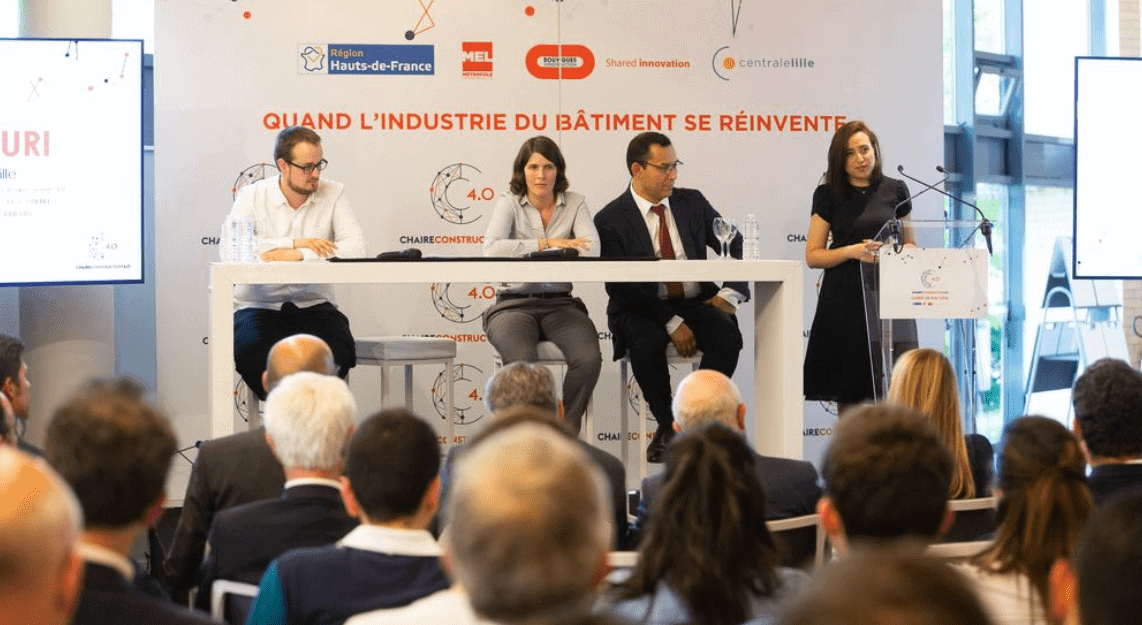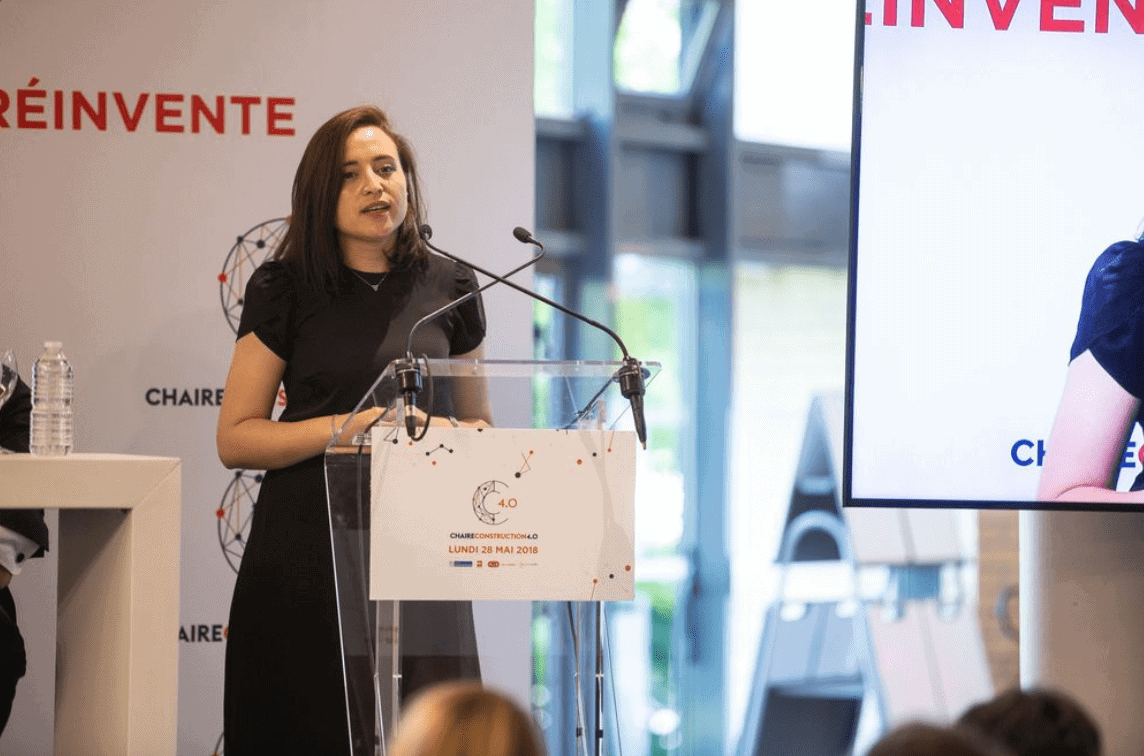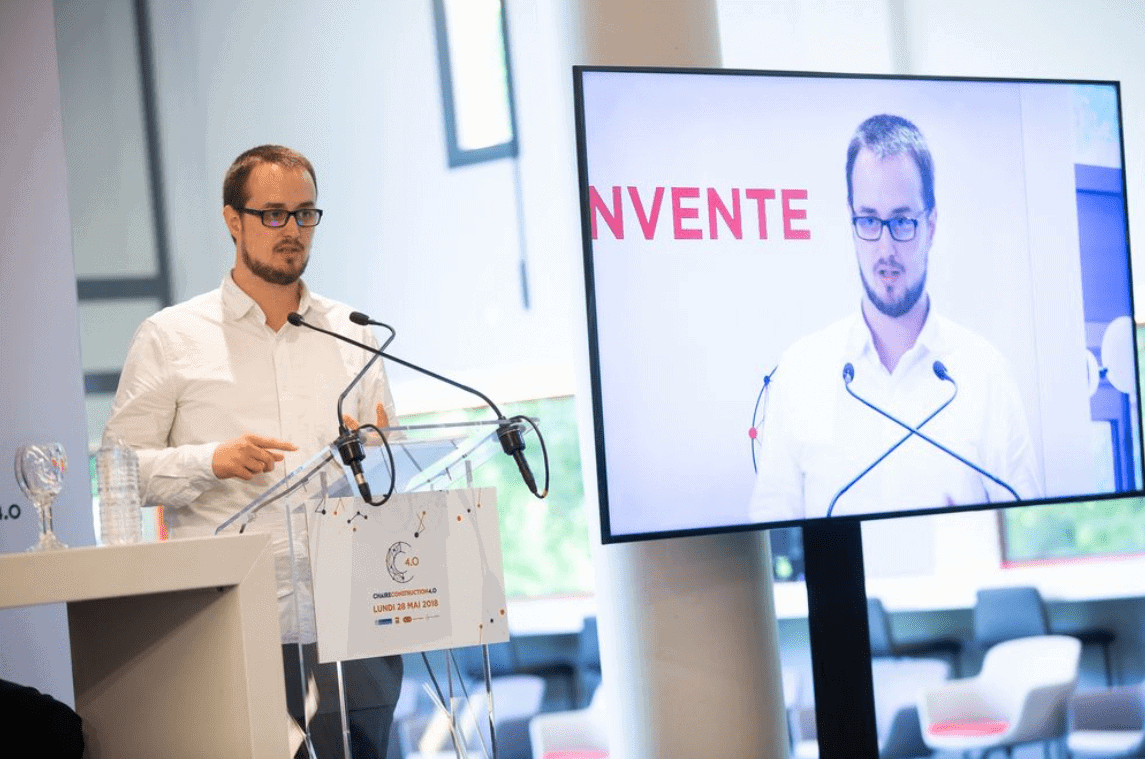
In the shoes of a doctoral candidate
3 minutes of reading
Bouygues Construction and Centrale Lille recently inaugurated the Construction 4.0 Chair, a partnership that represents the culmination of a 15-year relationship widely supported by the region and city. Two theses are already in the works. We met with the PhD students behind them.

“An Industrial research chair is a partnership aimed at addressing a complex problem in a sector that plays a key role in the national and regional economy and incorporates both applied and applicable research”, said Construction 4.0 Chair Professor Zoubeir Lafhaj during the programme’s inaugural ceremony.
For Emna Attouri and Thomas Danel, two students who have been working on their theses since June 2017 and have two years left to go, applied research is the primary focus of this collaboration.
Emna is a mechatronics engineer with a degree from Tunisia’s Sousa School of Engineering. She is pursuing a speciality in civil engineering at Centrale Lille.
“I’m collaborating with Emmanuel Delattre, a project manager with Bouygues Construction, and with the R&D division. I can also speak with site workers, which is especially helpful for making thorough, on-site observations”, she explained.
 This same practical aspect of research also drew Thomas Danel, an engineer in IT systems, microelectronics, and automation at Polytech Lille and a PhD student participating in the Construction 4.0 Chair programme.
In addition to doing pure research, Thomas has decided to tackle the real conditions companies face as well. Thomas is fully aware of the stakes involved in the use of data and dreams of designing a connected and fully controlled construction site. His weekly discussions with Damien Delbende, a project manager within the group, help ensure his thesis remains grounded in reality and practical matters.
Thomas also admits to enjoying the fast pace of business within a company. Just like Emna, he has access to all the data from the construction site he’s working on and receives training and supervision from Bouygues Construction.
This same practical aspect of research also drew Thomas Danel, an engineer in IT systems, microelectronics, and automation at Polytech Lille and a PhD student participating in the Construction 4.0 Chair programme.
In addition to doing pure research, Thomas has decided to tackle the real conditions companies face as well. Thomas is fully aware of the stakes involved in the use of data and dreams of designing a connected and fully controlled construction site. His weekly discussions with Damien Delbende, a project manager within the group, help ensure his thesis remains grounded in reality and practical matters.
Thomas also admits to enjoying the fast pace of business within a company. Just like Emna, he has access to all the data from the construction site he’s working on and receives training and supervision from Bouygues Construction.
 The two doctoral students also take part in bi-annual steering committees with Bruno Linéatte, R&D and Innovation Director with Bouygues Entreprises France-Europe in charge of the Building Construction Methods R&D Division with Bouygues Construction, and Philippe Richard, R&D Director in charge of the Ergonomy and Productivity Division.
Every year, the candidates take part in a meeting to report on the progress of their theses and any changes that have occurred.
Birth of a vocation
In a move that marks the start of a career for both Thomas and Emna, the decision to focus on the construction industry, which has still not adopted digital technologies and is far removed from their original area of training, was a very deliberate one. Thomas took up his thesis project after completing several opportunities, starting with an automation internship where he learned robots can be taken off the factory floor and directly installed on construction sites. He then met with Professor Zoubeir Lafhaj, who encouraged him to take the plunge.
As for Emna, the stagnant productivity level within the building and civil works industry represented a yet unexplored topic that is uniquely suited to useful and profitable innovations. Moreover, the same reason inspired Laure Ducoulombier (director of the Chair programme) to start working for Bouygues Construction. And with that, we’ve come full circle!
Once her thesis is complete in June 2020, Emna would like to work as an R&D engineer where she can put her expertise in idea and innovation management to go use, while Thomas would like to pursue research through a post-doctoral fellowship or as a scientific supervisor. We wish them every possible success!
The two doctoral students also take part in bi-annual steering committees with Bruno Linéatte, R&D and Innovation Director with Bouygues Entreprises France-Europe in charge of the Building Construction Methods R&D Division with Bouygues Construction, and Philippe Richard, R&D Director in charge of the Ergonomy and Productivity Division.
Every year, the candidates take part in a meeting to report on the progress of their theses and any changes that have occurred.
Birth of a vocation
In a move that marks the start of a career for both Thomas and Emna, the decision to focus on the construction industry, which has still not adopted digital technologies and is far removed from their original area of training, was a very deliberate one. Thomas took up his thesis project after completing several opportunities, starting with an automation internship where he learned robots can be taken off the factory floor and directly installed on construction sites. He then met with Professor Zoubeir Lafhaj, who encouraged him to take the plunge.
As for Emna, the stagnant productivity level within the building and civil works industry represented a yet unexplored topic that is uniquely suited to useful and profitable innovations. Moreover, the same reason inspired Laure Ducoulombier (director of the Chair programme) to start working for Bouygues Construction. And with that, we’ve come full circle!
Once her thesis is complete in June 2020, Emna would like to work as an R&D engineer where she can put her expertise in idea and innovation management to go use, while Thomas would like to pursue research through a post-doctoral fellowship or as a scientific supervisor. We wish them every possible success!
 This same practical aspect of research also drew Thomas Danel, an engineer in IT systems, microelectronics, and automation at Polytech Lille and a PhD student participating in the Construction 4.0 Chair programme.
In addition to doing pure research, Thomas has decided to tackle the real conditions companies face as well. Thomas is fully aware of the stakes involved in the use of data and dreams of designing a connected and fully controlled construction site. His weekly discussions with Damien Delbende, a project manager within the group, help ensure his thesis remains grounded in reality and practical matters.
Thomas also admits to enjoying the fast pace of business within a company. Just like Emna, he has access to all the data from the construction site he’s working on and receives training and supervision from Bouygues Construction.
This same practical aspect of research also drew Thomas Danel, an engineer in IT systems, microelectronics, and automation at Polytech Lille and a PhD student participating in the Construction 4.0 Chair programme.
In addition to doing pure research, Thomas has decided to tackle the real conditions companies face as well. Thomas is fully aware of the stakes involved in the use of data and dreams of designing a connected and fully controlled construction site. His weekly discussions with Damien Delbende, a project manager within the group, help ensure his thesis remains grounded in reality and practical matters.
Thomas also admits to enjoying the fast pace of business within a company. Just like Emna, he has access to all the data from the construction site he’s working on and receives training and supervision from Bouygues Construction.
 The two doctoral students also take part in bi-annual steering committees with Bruno Linéatte, R&D and Innovation Director with Bouygues Entreprises France-Europe in charge of the Building Construction Methods R&D Division with Bouygues Construction, and Philippe Richard, R&D Director in charge of the Ergonomy and Productivity Division.
Every year, the candidates take part in a meeting to report on the progress of their theses and any changes that have occurred.
Birth of a vocation
In a move that marks the start of a career for both Thomas and Emna, the decision to focus on the construction industry, which has still not adopted digital technologies and is far removed from their original area of training, was a very deliberate one. Thomas took up his thesis project after completing several opportunities, starting with an automation internship where he learned robots can be taken off the factory floor and directly installed on construction sites. He then met with Professor Zoubeir Lafhaj, who encouraged him to take the plunge.
As for Emna, the stagnant productivity level within the building and civil works industry represented a yet unexplored topic that is uniquely suited to useful and profitable innovations. Moreover, the same reason inspired Laure Ducoulombier (director of the Chair programme) to start working for Bouygues Construction. And with that, we’ve come full circle!
Once her thesis is complete in June 2020, Emna would like to work as an R&D engineer where she can put her expertise in idea and innovation management to go use, while Thomas would like to pursue research through a post-doctoral fellowship or as a scientific supervisor. We wish them every possible success!
The two doctoral students also take part in bi-annual steering committees with Bruno Linéatte, R&D and Innovation Director with Bouygues Entreprises France-Europe in charge of the Building Construction Methods R&D Division with Bouygues Construction, and Philippe Richard, R&D Director in charge of the Ergonomy and Productivity Division.
Every year, the candidates take part in a meeting to report on the progress of their theses and any changes that have occurred.
Birth of a vocation
In a move that marks the start of a career for both Thomas and Emna, the decision to focus on the construction industry, which has still not adopted digital technologies and is far removed from their original area of training, was a very deliberate one. Thomas took up his thesis project after completing several opportunities, starting with an automation internship where he learned robots can be taken off the factory floor and directly installed on construction sites. He then met with Professor Zoubeir Lafhaj, who encouraged him to take the plunge.
As for Emna, the stagnant productivity level within the building and civil works industry represented a yet unexplored topic that is uniquely suited to useful and profitable innovations. Moreover, the same reason inspired Laure Ducoulombier (director of the Chair programme) to start working for Bouygues Construction. And with that, we’ve come full circle!
Once her thesis is complete in June 2020, Emna would like to work as an R&D engineer where she can put her expertise in idea and innovation management to go use, while Thomas would like to pursue research through a post-doctoral fellowship or as a scientific supervisor. We wish them every possible success! More reading
Read also



What lies ahead? 7 megatrends and their influence on construction, real estate and urban development
Article
20 minutes of reading

Energy
in partnership with


‘Paris at 50°C’: a fact-finding mission to prepare Paris for future heatwaves
Article
2 minutes of reading

